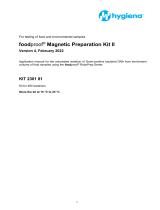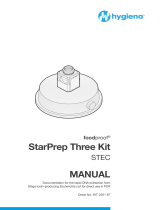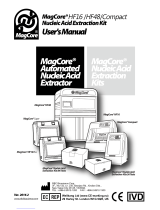
RapidFinder™ Direct Lysis Protocol
Publication Number 4485956 Revision A
■Overview ............................................................ 1
■Required materials .................................................... 2
■Prepare DNA by direct lysis of enriched cultures .......................... 2
Appendix A Sample enrichment ........................................... 3
■Sample enrichment .................................................... 3
Documentation and Support ............................................... 4
■Obtaining SDSs ....................................................... 4
■Obtaining Certificates of Analysis ....................................... 4
■Obtaining support ..................................................... 4
■Limited product warranty .............................................. 4
WARNING! Read the Safety Data Sheets (SDSs) and follow the handling in‐
structions. Wear appropriate protective eyewear, clothing, and gloves. Safety
Data Sheets (SDSs) are available from www.lifetechnologies.com/support.
Overview
The RapidFinder™ Direct Lysis Protocol is a simple, rapid method for preparation of
nucleic acid for PCR from enriched cultures of food and environmental samples. The
protocol is intended for use with cultures enriched for E. coli O157:H7, Salmonella spp.,
Listeria monocytogenes, or Listeria spp.
Enriched cultures are treated with Proteinase K in a specially formulated Lysis Buffer
at 55°C for 30 minutes, followed by heat inactivation of the Proteinase K at 95°C. The
procedure can be completed in about 45 minutes with minimal hands‐on time. The ly‐
sate is ready for use in downstream PCR using one of the following detection kits as
appropriate for the pathogen of interest.
Detection kit Catalog number
MicroSEQ®
E. coli
O157:H7 Detection Kit 4427409
MicroSEQ®
Salmonella
spp. Detection Kit 4403930
MicroSEQ®
Listeria monocytogenes
Detection Kit 4403874
MicroSEQ®
Listeria
spp. Detection Kit 4427410
USER BULLETIN
For testing of Food and Environmental samples only.

Required materials
Unless otherwise specified, all materials are available from Life Technologies.
Item Source
Lysis Buffer, FS (7 mL)[1] Cat. no. 4480724
Proteinase K, FS (1.25 mL)[1] Cat. no. 4480715
Nuclease-free Water, 50 mL Cat. no. AM9937
MicroAmp® Optical 96-Well Reaction Plates Cat. no. N8010560
ABgene® Adhesive PCR Plate Seals, PCR Foil Thermo Scientific AB-0626 [2]
Thermal cycler, 96-well format:
GeneAmp® PCR System 9700 or equivalent
Visit www.lifetechnologies.com
Multi-channel pipettor MLS[3]
Aerosol-resistant pipette tips MLS
[1] Sufficient for 100 reactions.
[2] Recommended because it is designed to avoid clogged pipette tips.
[3] MLS: major laboratory supplier.
Prepare DNA by direct lysis of enriched cultures
Before you begin: culture food or environmental samples for the pathogen of interest
as described in Appendix A, “Sample enrichment”.
1. Prepare sufficient Lysis Solution Mix for the number of reactions required, plus
10% overage.
Component Volume per reaction
Lysis Buffer, FS 63 µL
Proteinase K, FS 10 µL
Nuclease-free Water 127 µL
2. Distribute Lysis Solution Mix and enriched cultures to the appropriate wells in a
standard 96‐well PCR plate.
Component Volume per well
Enriched culture 5 µL
Lysis Solution Mix 200 µL
3. Seal the plate with an aluminum plate seal.
Ensure that the wells are sealed properly, to avoid evaporation and cross‐con‐
tamination.
RapidFinder™ Direct Lysis Protocol
Required materials
2
RapidFinder™ Direct Lysis Protocol

4. Invert the plate at least 5 times to mix the enriched culture with Lysis Solution
Mix.
5. Load the plate in a thermal cycler and run the following program:
Temperature Time
55°C 30 min
95°C 10 min
4°C ∞[1]
[1] Hold at 4°C until the plate is removed for use in PCR or for storage.
The lysate is ready for PCR using the appropriate MicroSEQ® detection kit for the
pathogen of interest.
• Use 30 µL of lysate per PCR assay.
• Pipet the lysate directly from the plate by puncturing the aluminum seal with the
pipette tip.
Note: If you use a pierceable aluminum foil seal other than the one recommen‐
ded, be sure to check for clogged tips when pipetting samples.
STOPPING POINT Store the sealed plate at 4°C for up to 72 hours, or store long‐term at
–20°C.
If the seal has been punctured, place another seal on top of the original seal before
storage. Do not remove the original seal from the plate, to avoid cross‐contamination.
Appendix A Sample enrichment
Sample enrichment
Enrich food and environmental samples according to the ISO standards for the patho‐
gen of interest, with noted modifications.
Pathogen ISO standard Modification
E. coli
O157:H7 ISO 16654 Recommended: use Buffered Peptone
Water in place of modified Tryptone
Soy Broth.
Salmonella
spp. ISO 6579 None.
Listeria monocytogenes
ISO 11290-1 Secondary enrichment for 24 hours.
Listeria
spp.
Appendix A Sample enrichment
Sample enrichment
RapidFinder™ Direct Lysis Protocol
3

Documentation and Support
Obtaining SDSs
Safety Data Sheets (SDSs) are available from www.lifetechnologies.com/support
Note: For the SDSs of chemicals not distributed by Life Technologies, contact the
chemical manufacturer.
Obtaining Certificates of Analysis
The Certificate of Analysis provides detailed quality control and product qualification
information for each product. Certificates of Analysis are available on our website. Go
to www.lifetechnologies.com/support and search for the Certificate of Analysis by
product lot number, which is printed on the box.
Obtaining support
For the latest services and support information for all locations, go to:
www.lifetechnologies.com/support
At the website, you can:
• Access worldwide telephone and fax numbers to contact Technical Support and
Sales facilities
• Search through frequently asked questions (FAQs)
• Submit a question directly to Technical Support ([email protected])
• Search for user documents, SDSs, vector maps and sequences, application notes,
formulations, handbooks, certificates of analysis, citations, and other product
support documents
• Obtain information about customer training
• Download software updates and patches
Limited product warranty
Life Technologies Corporation and/or its affiliate(s) warrant their products as set forth
in the Life Technologies' General Terms and Conditions of Sale found on Life Tech‐
nologies' website at www.lifetechnologies.com/termsandconditions. If you have any
questions, please contact Life Technologies at www.lifetechnologies.com/support.
Documentation and Support
Obtaining SDSs
4
RapidFinder™ Direct Lysis Protocol

For testing of Food and Environmental samples only.
The information in this guide is subject to change without notice.
DISCLAIMER
LIFE TECHNOLOGIES CORPORATION AND/OR ITS AFFILIATE(S) DISCLAIM ALL WARRANTIES WITH RESPECT TO THIS DOCUMENT, EXPRESSED OR IMPLIED, IN-
CLUDING BUT NOT LIMITED TO THOSE OF MERCHANTABILITY, FITNESS FOR A PARTICULAR PURPOSE, OR NON-INFRINGEMENT. TO THE EXTENT ALLOWED BY
LAW, IN NO EVENT SHALL LIFE TECHNOLOGIES AND/OR ITS AFFILIATE(S) BE LIABLE, WHETHER IN CONTRACT, TORT, WARRANTY, OR UNDER ANY STATUTE OR
ON ANY OTHER BASIS FOR SPECIAL, INCIDENTAL, INDIRECT, PUNITIVE, MULTIPLE OR CONSEQUENTIAL DAMAGES IN CONNECTION WITH OR ARISING FROM
THIS DOCUMENT, INCLUDING BUT NOT LIMITED TO THE USE THEREOF.
TRADEMARKS
The trademarks mentioned herein are the property of Life Technologies Corporation and/or its affiliate(s) or their respective owners. ABgene® is a registered
trademark of Abgene, Ltd.
© 2013 Life Technologies Corporation. All rights reserved.
Headquarters
5791 Van Allen Way | Carlsbad, CA 92008 USA | Phone +1 760 603 7200 | Toll Free in USA 800 955 6288
For support visit lifetechnologies.com/support or email [email protected]
lifetechnologies.com
21 May 2013
/













